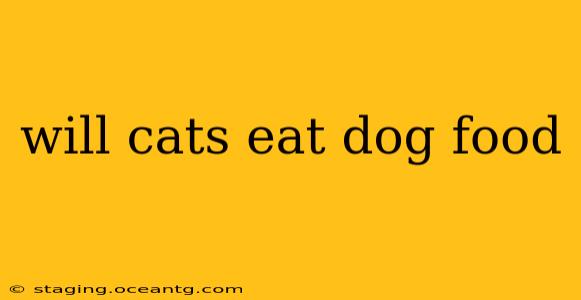The question of whether cats will eat dog food is a common one among pet owners. While a cat might nibble on dog food if presented with it, it's crucial to understand that doing so regularly isn't ideal for their health. This article will delve into why feeding cats dog food is generally discouraged, exploring the nutritional differences and potential consequences.
Why Cats Shouldn't Regularly Eat Dog Food
Cats are obligate carnivores, meaning their bodies are specifically designed to thrive on a diet rich in animal protein. Dog food, while containing some animal protein, often differs significantly in its formulation compared to cat food. These differences can lead to several health problems.
Nutritional Deficiencies
Cat food is formulated to meet the specific nutritional needs of felines, including higher levels of taurine, arachidonic acid, and arginine. These nutrients are crucial for feline health; taurine deficiency, for example, can lead to serious heart problems. Dog food, while containing these nutrients, often doesn't provide the same levels, potentially leading to deficiencies over time.
Higher Carbohydrate Content
Many dog foods contain higher levels of carbohydrates compared to cat food. Cats don't require high carbohydrate intake and can process it less efficiently than dogs. Excess carbohydrates can lead to weight gain, obesity, and related health issues in cats.
Lower Protein Content
While dog food contains protein, it often falls short of the level required for a cat's optimal health and energy levels. A consistently low protein diet can lead to muscle wasting, a weakened immune system, and other health problems.
What Happens If My Cat Eats Dog Food?
Occasional nibbling of dog food is unlikely to cause immediate harm, particularly if the amount is small. However, consistently feeding your cat dog food as a primary or supplemental food source can lead to the nutritional deficiencies mentioned above, impacting their long-term health and well-being. Signs of nutritional deficiencies may include weight loss, lethargy, poor coat condition, and digestive problems.
What Should I Feed My Cat Instead?
Always choose a high-quality cat food formulated to meet the Association of American Feed Control Officials (AAFCO) nutritional standards for cats. Look for cat food that lists named animal proteins (e.g., chicken, turkey, fish) as the primary ingredients. Avoid foods with excessive fillers or artificial ingredients.
Can a Cat Survive on Dog Food?
While a cat might survive for a short period on dog food, it is not a sustainable or healthy long-term dietary solution. The lack of essential nutrients can lead to serious health problems and significantly reduce the cat's lifespan and quality of life.
My Cat Prefers Dog Food Over Cat Food – What Should I Do?
If your cat consistently prefers dog food, consult your veterinarian. There could be underlying health issues or taste preferences at play. Your vet can help determine the reason and advise you on how to encourage your cat to eat appropriate cat food. They might suggest trying different flavors, textures, or feeding methods.
Is it Safe to Mix Cat and Dog Food?
Mixing cat and dog food isn't recommended. While small amounts might not be harmful, the nutritional balance becomes compromised. Stick to providing your cat with a cat food that meets their specific needs.
In conclusion, while your cat might show interest in dog food, it's crucial to prioritize their health by providing them with a diet formulated to meet their unique nutritional requirements. Regular consumption of dog food can lead to serious health consequences, so always opt for a high-quality cat food. If you have concerns about your cat's diet or preferences, consult your veterinarian.
